Figuring out which of your marketing efforts actually work can feel like a guessing game. You're running ads on social media, writing blog posts, and sending out emails, but which ones are truly bringing in customers? Without a clear picture, you might be wasting money on channels that don't deliver. This is where the best marketing attribution software comes in. It connects the dots, showing you the exact path a customer takes from the first ad they see to the final purchase.
This guide is designed to help you find the right tool without the confusing jargon. We’ve reviewed the top platforms to give you a straightforward look at what they offer, who they're for, and what they might cost. Whether you're an e-commerce store trying to get more from your ad budget or a B2B company tracking a long sales process, the right software can change everything.
Getting attribution right means you can finally measure marketing ROI accurately and make decisions based on real data. In the list below, you’ll find tools for every type of business, from big enterprise solutions like Adobe Marketo Measure to e-commerce favorites like Northbeam. Each review gives you a clear overview so you can choose wisely and make every marketing dollar count.
1. MarkTag – Track First-Party Customer Data With Cutting-Edge Precision
Markopolo's MarkTag is our top pick for the best marketing attribution software because it solves one of the biggest problems for marketers today: getting accurate data. Many tools rely on old methods that are easily blocked by ad blockers or new browser privacy settings. MarkTag uses a more reliable server-side tracking approach. This means data is sent directly from your website's server to your analytics tools, bypassing the issues that block other trackers.
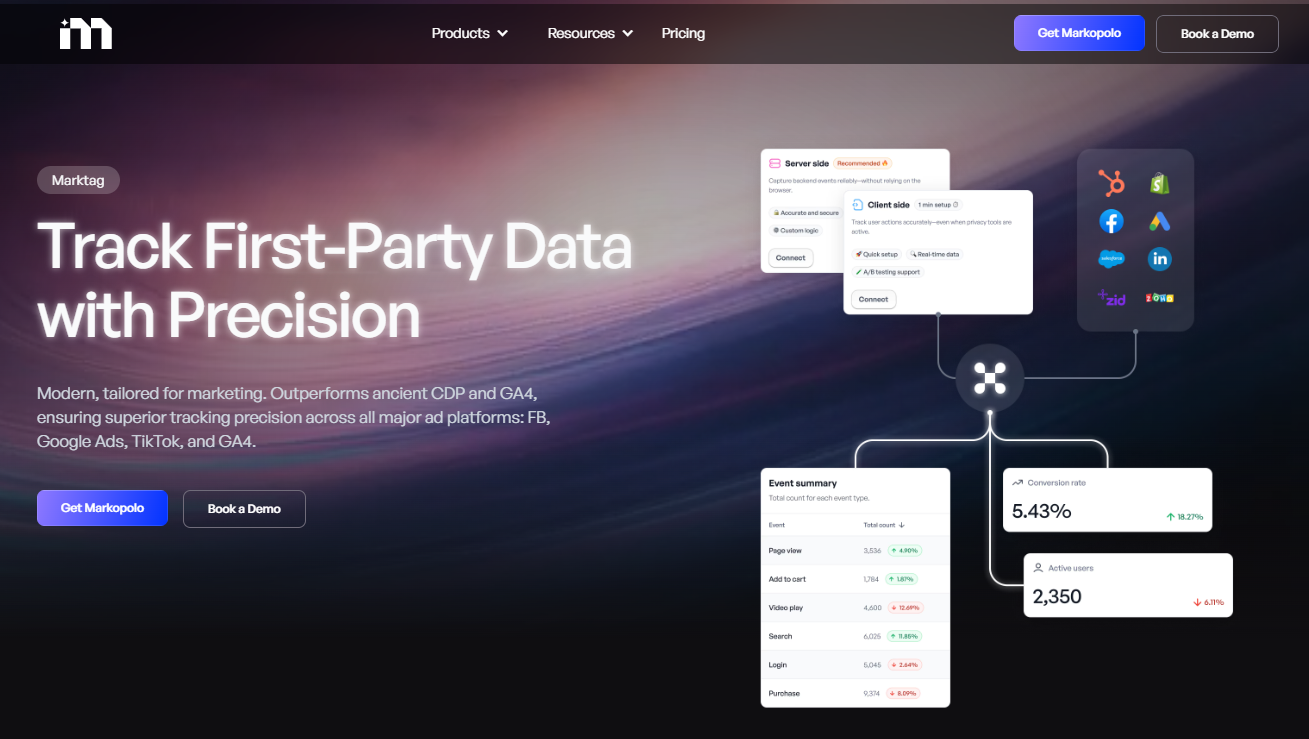
The result is a much clearer and more complete picture of your customer's journey. You can confidently see which channels and campaigns are actually leading to sales, allowing you to spend your budget more effectively. MarkTag brings together data from platforms like Meta, Google Ads, TikTok, and GA4 into one simple dashboard, so you don't have to piece together reports from different places.
Core Features and Use Cases
- Accurate and Reliable Data: MarkTag’s server-side tracking provides marketers with a highly accurate and reliable source of truth.
- Technical Setup: May require some technical assistance, especially for teams without a dedicated developer, but enables precise attribution and actionable insights.
- Seamless Integrations: Connects easily with all major ad and analytics tools for a unified view of marketing efforts.
- User-Friendly Dashboard: Designed for clarity, turning complex data into easy-to-understand insights to support informed decision-making.
- Part of Markopolo Suite: MarkTag is part of the larger AI-driven marketing suite, Markopolo, expanding capabilities beyond tracking alone.
- Future-Proof Marketing: Helps brands stay ahead of cookie deprecation and privacy regulations while offering cross-channel reporting in one dashboard.
2. Adobe Marketo Measure (formerly Bizible)
Adobe Marketo Measure (you might know it as Bizible) is a heavy-duty tool built for large B2B companies. Its specialty is tracking long and complicated customer journeys where multiple people are involved in a purchasing decision. It connects every marketing and sales interaction—from website visits to sales calls—directly to revenue in your CRM, giving you a clear view of what’s driving your business.
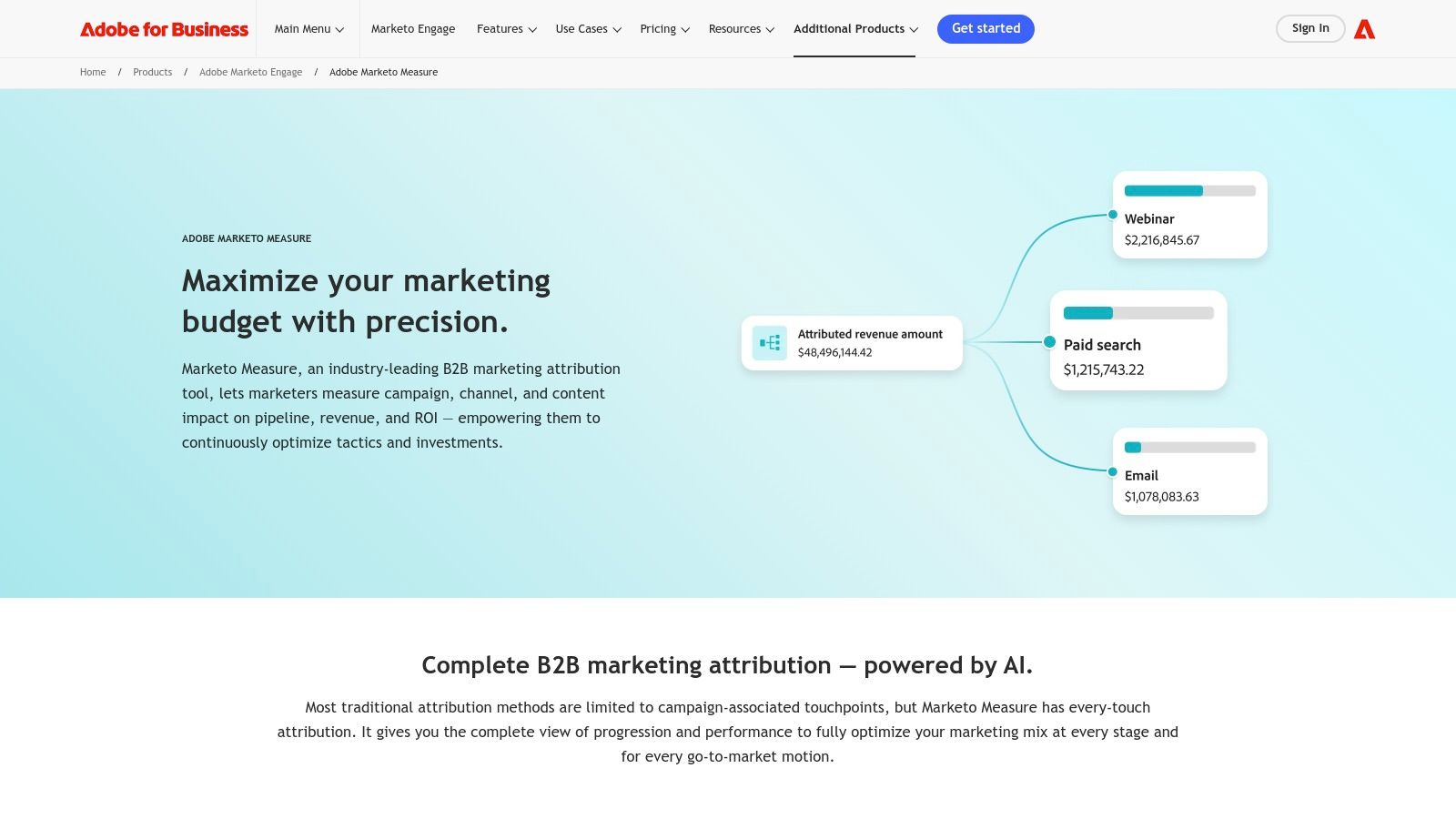
Unlike many other tools that only focus on online activities, Marketo Measure can also track offline touchpoints like trade shows or direct mail. It integrates deeply with Salesforce and Microsoft Dynamics, placing its reports right where your sales and marketing teams already work. This makes it a powerful choice for businesses that need to understand how all their efforts, both online and off, contribute to the bottom line.
Core Features and Use Cases
- B2B-Centric Attribution: Designed specifically for B2B sales cycles, it tracks interactions at an account level and connects them to sales opportunities and revenue.
- Flexible Modeling: You can analyze your data using different attribution models (like U-shaped or W-shaped) to see which touchpoints are most influential. This is much better than simple models; you can explore the limitations of last-touch attribution to see why this matters.
- AI-Driven Insights: An AI feature helps you understand the true value of each marketing touchpoint, making it easier to decide where to invest your budget.
3. AppsFlyer
AppsFlyer is a leader in the world of mobile app marketing. If your business is centered around an app, this tool is essential for understanding how users find and interact with it. It tracks which marketing campaigns drive app installs, what users do inside the app, and how engaged they are. While it’s built for mobile, it can also connect the dots between web and app journeys, giving you a complete view of your mobile-focused customers.
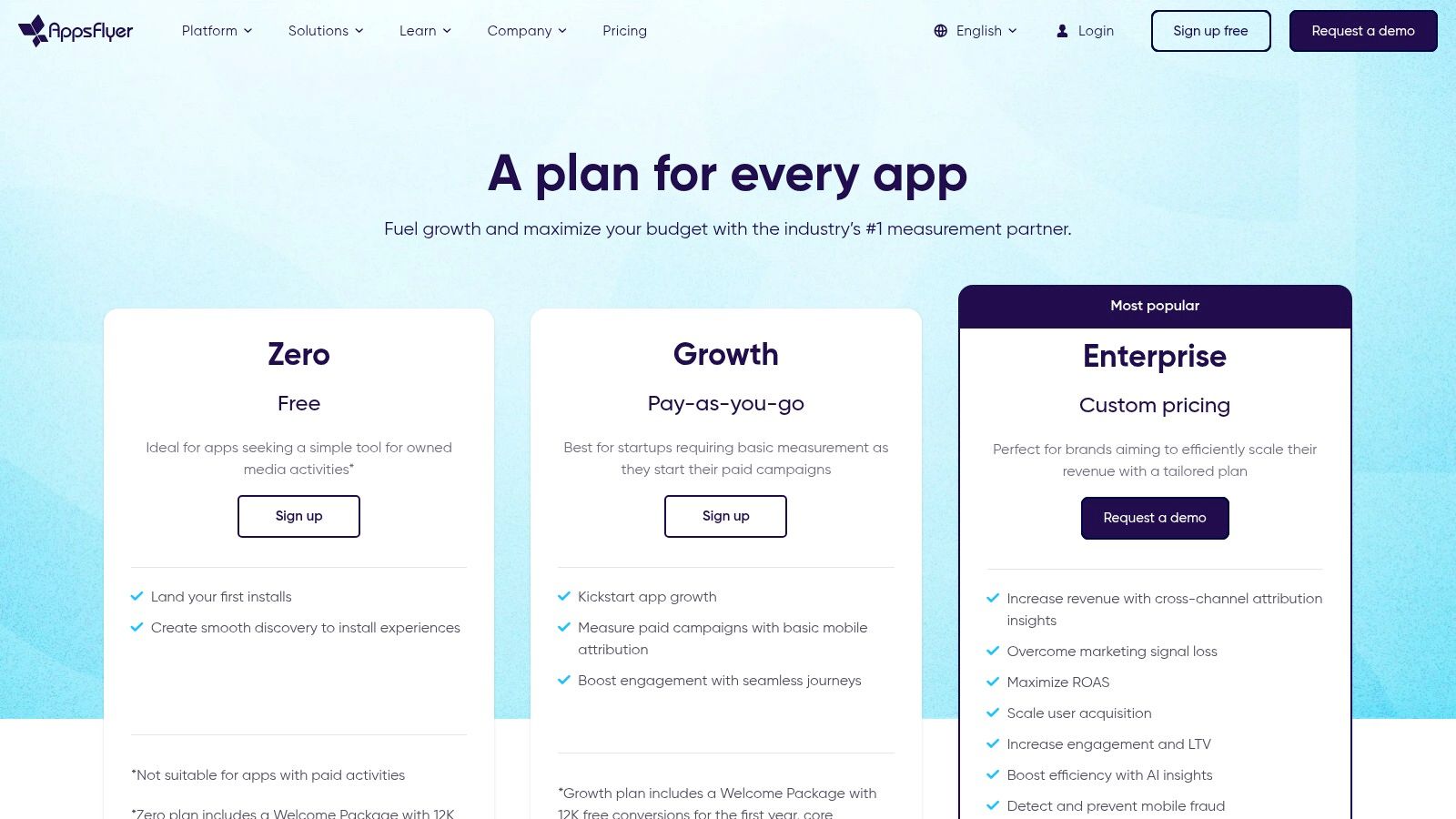
What makes AppsFlyer stand out is its deep understanding of the mobile world's unique challenges, like ad fraud and new privacy rules from Apple. It has a massive network of integrations, meaning it works with thousands of ad platforms to ensure your data is consistent everywhere. This makes it a top contender for anyone looking for the best marketing attribution software specifically for mobile apps.
Core Features and Use Cases
- Mobile-First Measurement: Accurately tracks app installs and in-app actions back to the specific ad campaigns that drove them.
- Cross-Platform Journeys: Connects user activity across mobile, web, and desktop to give you a unified view of the customer journey.
- Privacy-Centric Tooling: Offers advanced solutions to navigate Apple's new privacy framework (SKAdNetwork) and Google's Privacy Sandbox.
- Deep Linking & Fraud Protection: Creates smooth user experiences by sending users directly to specific pages within your app and has powerful tools to block fraudulent clicks and installs.
4. ThoughtMetric
ThoughtMetric is a user-friendly marketing attribution platform built for e-commerce brands. Its core philosophy is to make complex data accessible and actionable.

Core Features and Use Cases
- Multiple attribution models: Choose from first touch, last touch, linear paid, position-based, or multi-touch models to align with your marketing goals.
- Campaign performance insights: Analyze results across channels, campaigns, and ad sets to see what drives traffic, engagement, and sales.
- Product analytics: View performance at the SKU level to identify top products and customer segments.
- Creative performance tracking: Measure how ad visuals and messaging impact conversions.
- Customer analytics: Understand behavior, journey paths, and purchase drivers to improve lifetime value.
- Server-side tagging: Prevent data loss from iOS updates and ad blockers for more accurate tracking.
- Customer surveys: Collect post-purchase insights directly from shoppers.
- Simple pricing: One plan, all features. Pricing starts at $99 per month for 50,000 pageviews.
5. Adjust
Adjust is a mobile analytics platform designed to give app marketers clear and useful attribution data. As a leading mobile measurement partner (MMP), it specializes in tracking the entire user journey, from the first ad they see to what they do inside the app. This makes it a go-to tool for businesses where the mobile app is the main focus. Its strong emphasis on fraud prevention and compliance with the latest privacy rules from Apple makes it a trustworthy choice.
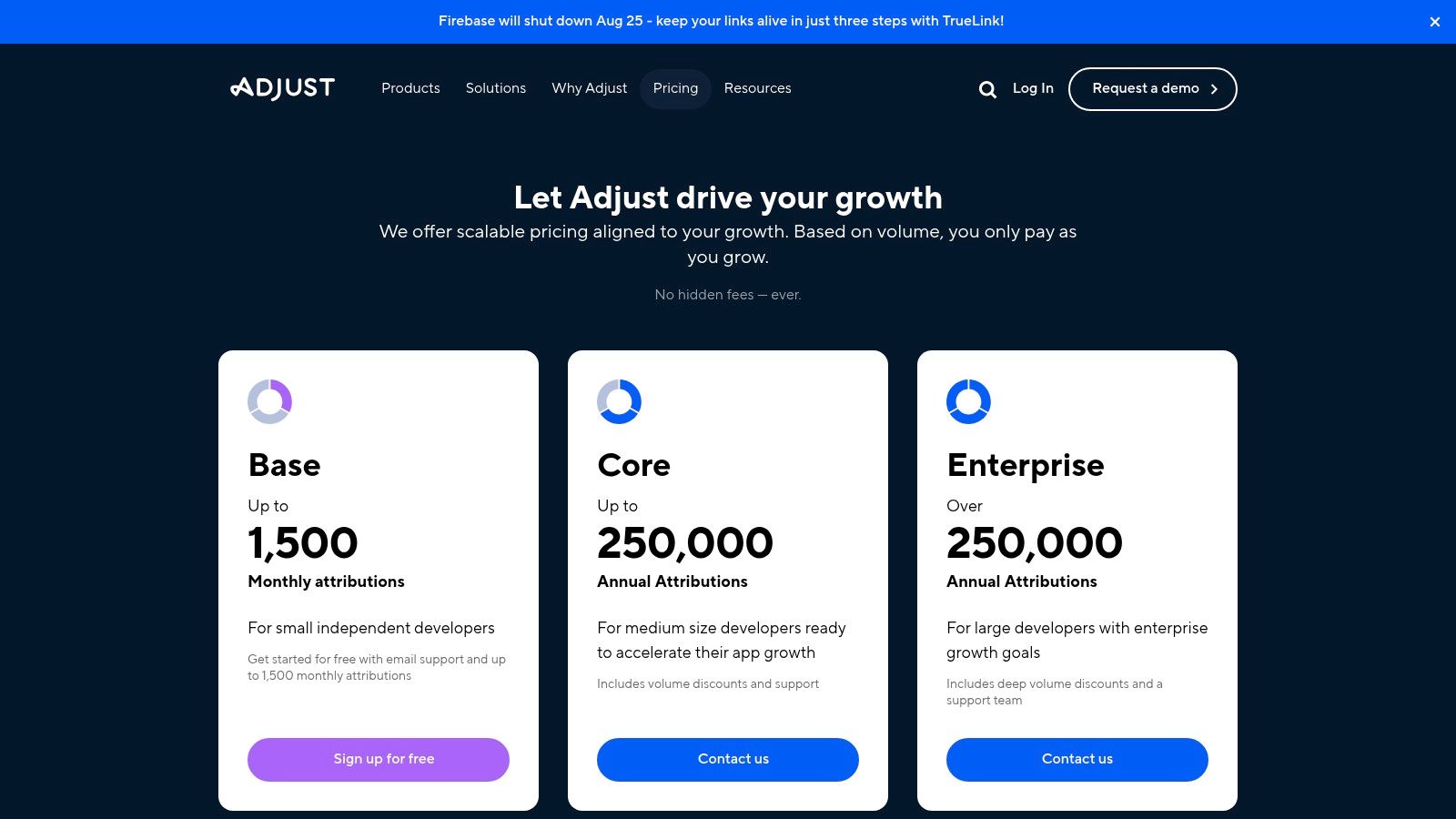
One of the best things about Adjust is how easy it is for new and growing apps to get started, thanks to its free base plan. While it is primarily a mobile attribution tool, it offers add-ons for web and Connected TV (CTV) tracking, allowing businesses to get a more complete view of their marketing as they grow and expand their advertising efforts.
Core Features and Use Cases
- Mobile-Centric Attribution: Accurately connects app installs and in-app events back to the specific marketing campaigns and ads that drove them.
- SKAN and iOS 14.5+ Support: Provides strong solutions to measure campaign performance within Apple's new privacy framework, helping marketers adapt to industry changes.
- Datascape Analytics Platform: A central dashboard that visualizes performance data, allowing you to analyze key metrics and user behavior.
- Fraud Prevention Suite: Proactively blocks fake installs and clicks in real-time, protecting your ad budget and keeping your data clean.
6. Singular
Singular stands out as a mobile measurement partner (MMP) that has grown into a unified marketing analytics platform. It's excellent at combining data on how much you spend on ads with detailed attribution data. This gives you a complete picture of your mobile marketing performance, from ad costs to results. It's an essential tool for app-focused businesses and performance marketers who need to optimize their ad spend across many different channels.
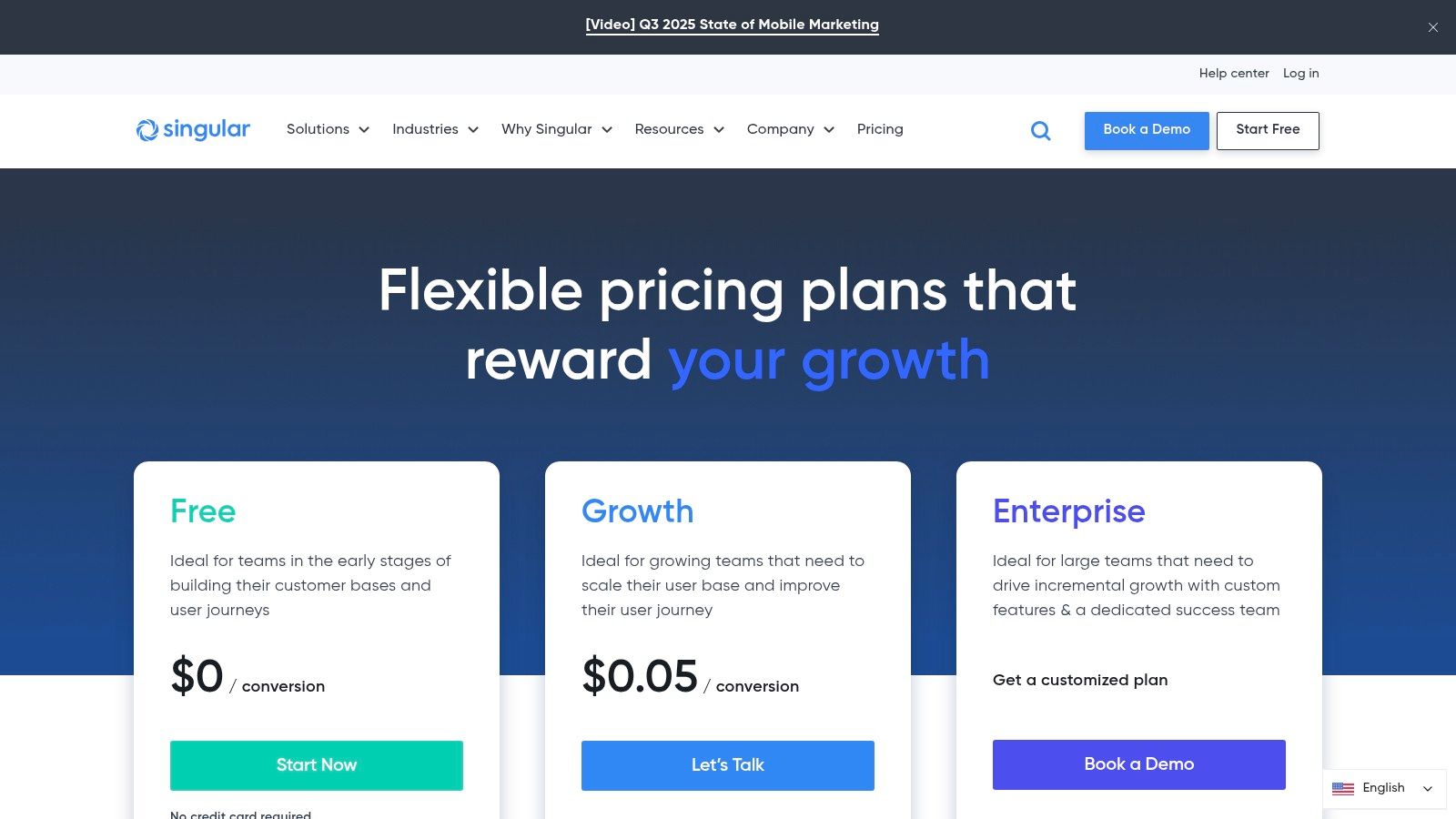
Unlike many tools that focus only on web or B2B, Singular was built for mobile but now supports data from offline, desktop, and mobile sources. A key advantage is its transparent and predictable pricing, along with powerful data access. This allows teams to go beyond basic dashboards and dig into the raw data needed for deep analysis and optimization.
Core Features and Use Cases
- Unified Cost Aggregation: Singular automatically gathers spending data from thousands of marketing sources and connects it directly to attribution results for a true ROI calculation.
- Mobile-First Attribution: It offers top-notch attribution for mobile app installs and in-app events, including advanced analytics for Apple’s SKAdNetwork (SKAN) privacy framework.
- Flexible Data Access: With powerful APIs and data export options, you can easily send raw data to your own business intelligence tools for custom analysis.
7. Northbeam
Northbeam is a marketing attribution platform designed specifically for direct-to-consumer (DTC) and e-commerce brands. It offers a powerful combination of multi-touch attribution (MTA) for day-to-day tactical decisions and marketing mix modeling (MMM) for long-term strategic planning. This two-part approach helps brands move beyond the simple metrics provided by ad platforms and get a true understanding of their marketing ROI.
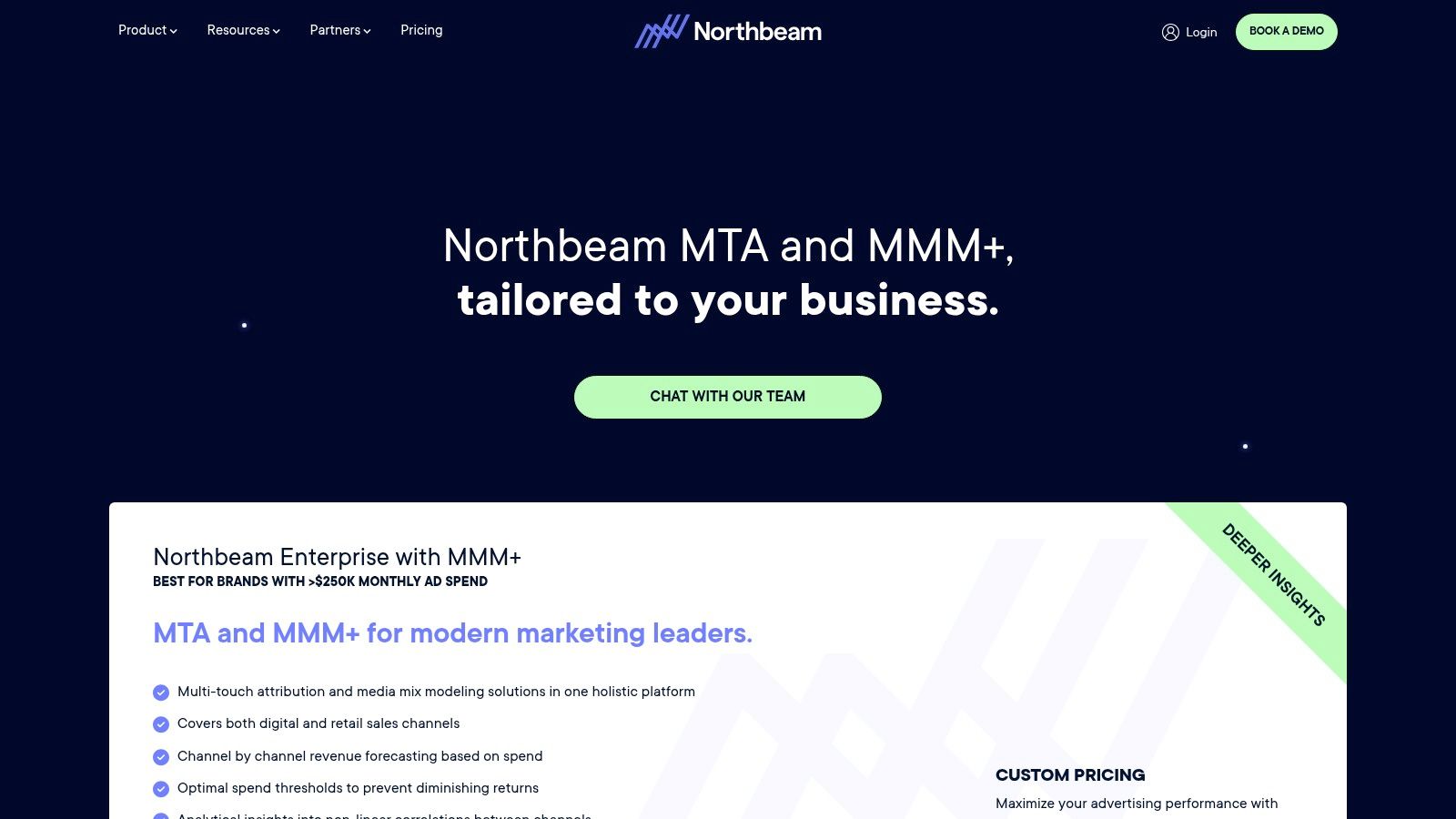
Unlike generic analytics tools, Northbeam is built for the modern e-commerce world, with a deep integration for platforms like Shopify. This focus allows it to deliver highly accurate first-party data that shows the full customer journey, from paid ads and social media to email and organic search. Its clear dashboards are designed to help marketers make faster, more confident decisions about their ad spend.
Core Features and Use Cases
- Blended Attribution Model: Combines daily MTA for quick campaign adjustments with high-level MMM for strategic budget allocation.
- Creative Analytics: Drills down to show you which specific ad creatives, headlines, and copy are driving the most sales.
- Customer Journey Mapping: Visualizes the complete path a customer takes to make a purchase, revealing how different channels work together to influence a sale. This is a key feature of the best marketing attribution software.
8. Triple Whale
Triple Whale is an analytics and attribution platform built for direct-to-consumer (DTC) brands, especially those on Shopify. It stands out by combining multi-touch attribution with a full suite of business intelligence (BI) tools. This provides a central hub for everything from marketing performance and creative analytics to overall store profitability. Its "Triple Pixel" technology offers a more accurate view of performance than what ad platforms report.
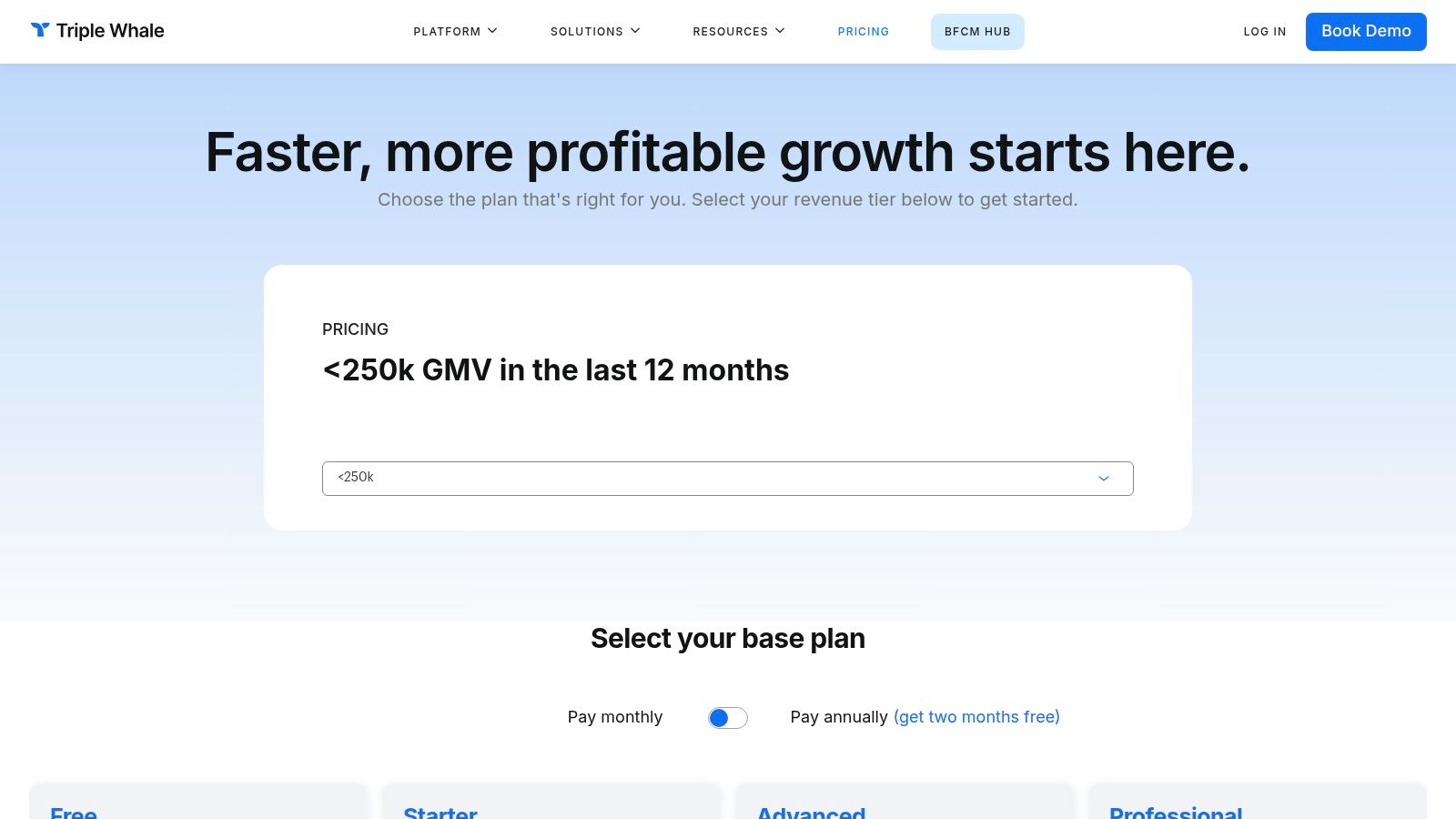
Unlike general attribution tools, Triple Whale is deeply rooted in the DTC world. It goes beyond clicks and conversions to analyze product performance, customer lifetime value (LTV), and profitability. The platform even uses post-purchase surveys to gather "zero-party data," adding customer feedback to its quantitative analysis. This makes it a complete solution for modern e-commerce businesses looking for one of the best marketing attribution software options.
Core Features and Use Cases
- DTC-Focused Analytics: A unified "Founders Dash" visualizes key metrics like Marketing Efficiency Ratio (MER), new customer acquisition cost, and profitability in real-time.
- Triple Pixel Attribution: Uses first-party server-side tracking to give you a clearer picture of the customer journey across all marketing channels.
- Creative and Product Insights: The platform analyzes the performance of your ads and products, helping you identify what’s working best.
9. HYROS
HYROS is an ad tracking and attribution platform designed to give businesses a clear return on ad spend (ROAS). It's particularly popular with e-commerce stores, info product creators, and companies that use phone calls to close sales. It excels at "identity resolution," which means it pieces together a user's journey even if they switch between different devices and platforms. This helps correct tracking errors from platforms like Meta and Google, giving marketers reliable data to scale their campaigns.
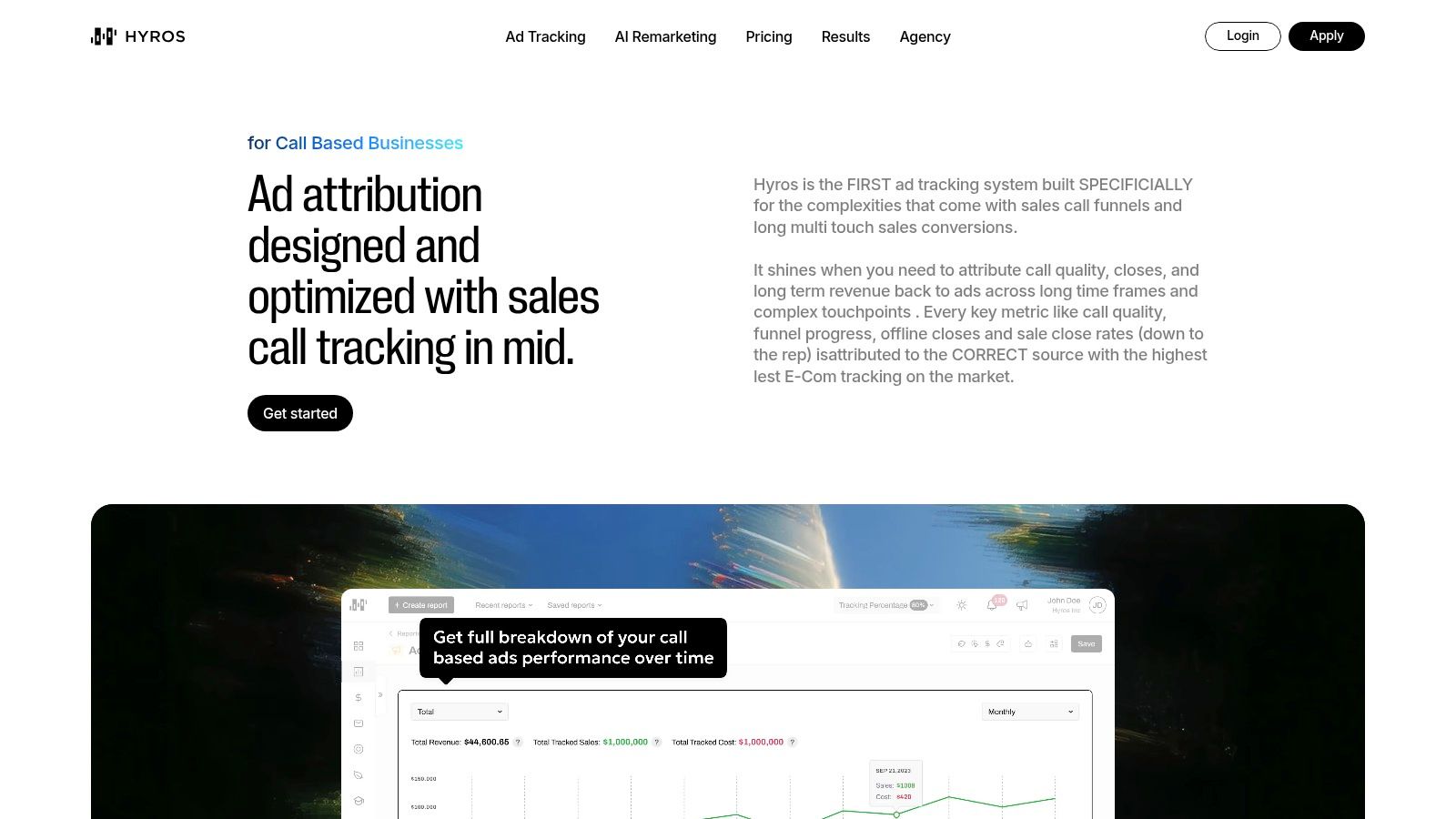
Unlike general analytics tools, HYROS is built to answer one key question: which of my ads are actually making me money? It connects ad clicks directly to revenue by integrating with a wide range of platforms, from Shopify to various CRMs and payment systems. It even offers a bold 90-day refund guarantee, showing its confidence in delivering a positive return on investment.
Core Features and Use Cases
- AI-Powered Ad Tracking: Uses a special tracking script and AI to follow a customer's journey from their first click to the final sale, even over long periods.
- Call Funnel Attribution: A unique feature is its ability to track sales that start online but are closed over the phone, connecting the final revenue back to the original ad.
- E-commerce & Info Product Focus: Has dashboards and integrations specifically for businesses selling digital or physical products, helping them optimize ad spend for maximum profit.
10. Rockerbox
Rockerbox is a measurement platform designed to give modern e-commerce brands a complete view of their marketing performance. It stands out by combining several measurement methods, including multi-touch attribution (MTA), marketing mix modeling (MMM), and incrementality testing, all based on first-party data. This blended approach provides a more accurate and reliable picture in today's privacy-focused advertising world.
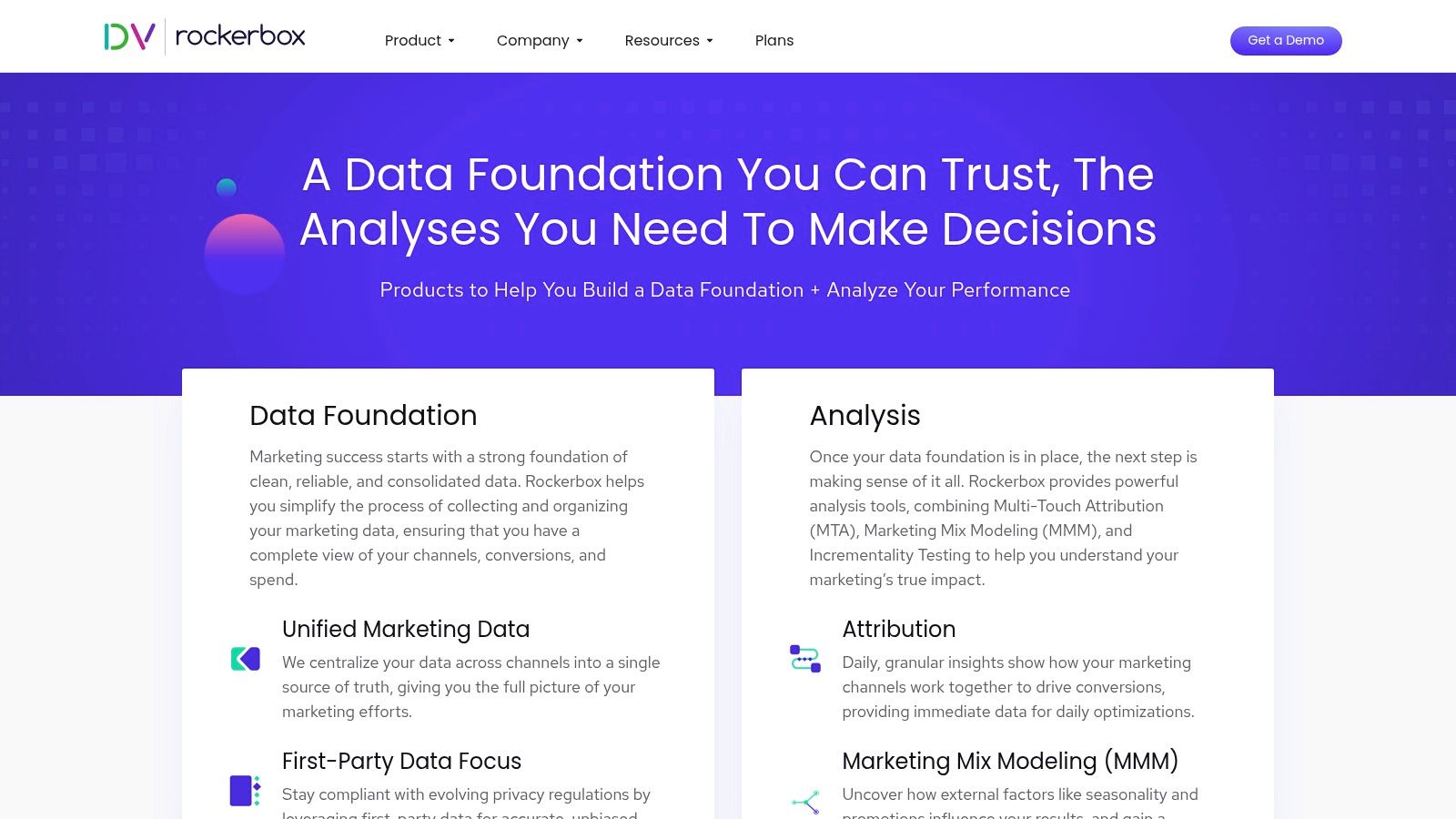
Unlike tools that rely on a single method, Rockerbox allows marketers to use daily multi-touch attribution for quick, tactical campaign adjustments while also using MMM for long-term, strategic budget planning. This dual capability, along with strong tracking for channels like CTV and offline marketing, makes it one of the more versatile marketing attribution software solutions for growing direct-to-consumer businesses.
Core Features and Use Cases
- Holistic Measurement: Combines daily MTA with strategic MMM, allowing marketers to make smart tactical decisions backed by big-picture budget insights.
- Incrementality Testing: Lets you run controlled experiments to measure the true causal impact of specific marketing channels and campaigns.
- First-Party Data Foundation: Built to collect and use first-party data, ensuring your tracking remains accurate as third-party cookies disappear.
- Data Portability: Offers robust data exports to data warehouses and BI tools, allowing for deeper, customized analysis.
11. G2 – Attribution Software Category
While not a software tool itself, G2’s Attribution Software category is an essential resource for anyone looking for a new solution. This popular software marketplace provides up-to-date rankings, verified user reviews, and detailed buyer guides, making it one of the best places to start your research. It gathers real-world feedback from users, offering an unbiased look at what different tools can actually do.
G2 makes the complex process of choosing software much easier. You can create side-by-side comparisons, filter tools by specific features or company size, and read in-depth reviews from people in your industry. This helps you quickly create a shortlist of platforms that fit your needs, saving you hours of research time.
Core Features and Use Cases
- Verified User Reviews: Access thousands of reviews from real users, providing honest feedback on setup, ease of use, and customer support.
- Comparison Grid Reports: See how different attribution tools stack up against each other based on user satisfaction and market presence.
- Feature-Based Filtering: Narrow down the long list of vendors by the features you need, the tools you want to integrate with, and the marketing KPIs you track. You can learn more about important marketing KPIs to track to help you with your search.
12. Capterra – Marketing Attribution Software
Like G2, Capterra isn't an attribution tool itself but rather a comprehensive directory of software. It’s an essential starting point for market research. As part of Gartner, it functions as a large, filterable catalog of available solutions, helping marketing teams create an initial shortlist based on criteria like features, pricing, and business size.
Capterra provides clarity by organizing information from dozens of vendors into a standardized format. You can see user reviews, feature lists, and company-provided details all in one place. This allows for quick, high-level comparisons, saving you significant time during the initial discovery phase of choosing the best marketing attribution software.
Core Features and Use Cases
- Filtered Search: Users can narrow down the extensive list of tools by required features, deployment type (e.g., cloud-based), and the size of their business.
- Side-by-Side Comparison: The platform allows you to select multiple products and view their features, ratings, and pricing information in a direct comparison table.
- Aggregated User Reviews: Access verified user reviews to gauge real-world performance, implementation challenges, and the quality of customer support for various platforms.
Marketing Attribution Software Comparison – Top 12 Tools
Making Your Final Decision on Attribution Software
Choosing the right marketing attribution software can feel overwhelming. As we’ve seen, the "best" tool isn't a one-size-fits-all answer. It's the one that perfectly matches your business, your data, and your goals. Whether you need the enterprise-level power of Adobe Marketo Measure or the sharp e-commerce focus of a tool like Northbeam, the options are as varied as the marketing channels they track.
The journey to finding the right fit starts with understanding your own needs. Are you a mobile-first company that needs a specialized tool like AppsFlyer or Adjust? Or are you a DTC brand trying to understand a complex customer journey, where HYROS or Rockerbox might be a better fit? This guide was designed to make those differences clear, moving beyond just features to explain who each platform is really for.
Key Takeaways for Choosing Your Attribution Partner
The most important lesson is this: your attribution is only as good as your data. Platforms like MarkTag show how critical clean, first-party data is for accurate measurement. This is the foundation of modern attribution.
Before you make a decision, consider these final points:
- Business Model Alignment: Is your main goal generating B2B leads, getting mobile app installs, or driving e-commerce sales? The right tool will be built for your world. B2B marketers might prefer Adobe Marketo Measure, while mobile marketers will be better off with Branch or Singular.
- Technical Resources: Think about what it will take to set up the software. Some tools require a lot of developer help, while others are more "plug-and-play." Be realistic about your team's capabilities.
- Scalability and Future Needs: Where do you see your business in the next two years? Choose a solution that can grow with you. A startup's needs are very different from an enterprise's, so pick a partner that aligns with your future plans.
- Data Granularity vs. Usability: The most powerful tools can also be the most complicated. Find a balance between getting detailed data and your team's ability to actually use those insights to make better decisions.
Your Actionable Next Steps
With this information, your path forward should be clearer. Don't just rely on sales demos. Use resources like G2 and Capterra to read real user reviews and understand what it's actually like to use the software.
- Shortlist 2-3 top contenders from this list that best fit your business.
- Schedule personalized demos and come prepared with specific questions about your unique challenges and integration needs.
- Request a trial or proof-of-concept if you can, to test the software with your own data.
Ultimately, choosing the best marketing attribution software is an investment in clarity. It’s about moving from guessing to knowing, allowing you to spend your budget more effectively, prove the value of your marketing, and drive real growth. The right platform will turn a confusing mess of data into a clear story about your customer's journey.
Now that you have a strategy for measuring your marketing performance, the next step is optimizing it. Markopolo helps you leverage those insights by using AI to create, launch, and manage high-performing ad campaigns across all major platforms from a single dashboard. Turn your attribution data into action by visiting Markopolo to see how you can automate and scale your advertising success.







.jpg)
.jpg)
.jpg)



